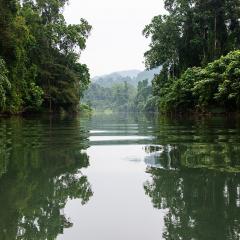Exciting international opportunities for some of Queensland’s finest undergraduate students have arisen due to $250,000 worth of New Colombo Plan funding being approved for innovative student mobility programs.
The University of Queensland’s School of Political Science and International Studies (POLSIS) was successful in receiving a grant for two students to travel to Vietnam in March 2020 for 6 to 10 weeks – in order to progress social development through environmental protection.
Associate Professor Nicole George from POLSIS said the purpose of this project was for students to gain perspective from grass-roots non-governmental organisations in Vietnam.
“This project was submitted to the NCP funding stream as part of POLSIS efforts to support students to extend their tertiary education experience by undertaking professional placements and to do this internationally where possible,” Associate Professor George said.
Funding was also received on a joint project with UQ and Griffith University for three Pacific Island Summer Schools to be held over three years, as well as 12 internships (four per year over three years) to the Pacific.
Associate Professor George worked with Associate Professor Gerhard Hoffstaedter (School of Social Science) and Associate Professor Sven Schottmann from Griffith University on the New Caledonia project, which gives groups of students from both institutions the opportunity for a unique global experience.
“The Pacific Field School will introduce students to aspects of the contemporary Pacific Islands, and build on longstanding connections forged in Pacific Island countries and with regional institutions of governance,” Associate Professor George said.
A series of seminars and workshops led by subject experts, government representatives and members of Brisbane’s Pasifika communities is capped by two-week in-country field study trips.
“The chief goal of the Pacific Islands Summer School is to introduce young Queenslanders to the cultures, politics and societies of their closest neighbours, and support closer people-to-people ties through new cross-border friendships and experiences,” Associate Professor George said.
“The 2020 iteration will focus on security; employing an inter-disciplinary perspective that will enable us to grapple with security as a complex, multilayered phenomenon, taking in gender, cultural, economic and geostrategic considerations.”
The Queensland Pacific Islands Summer School will see students travel to New Caledonia each year and then a second country in the region: 2020 to Fiji (10 students), 2021 to Vanuatu (12 students) and 2022 to the Solomon Islands (14 students).
All three second destinations are home to specialist University of the South Pacific (USP) campuses.
“Based on its strong bilateral relationships with Griffith University and UQ, USP has committed to providing access to discounted student accommodation and subsidised academic support in each of the secondary destinations,” Associate Professor George said.
The Queensland Pacific Islands Internship Scheme complements and builds upon the Queensland Pacific Islands Summer Schools and will enable high-quality students (two each from Griffith and UQ) to apply to undertake semester-length internships with regional intergovernmental agencies or national government agencies or local civil society groups.
Associate Professor George said she was enormously grateful for the financial support received from the New Colombo Plan and believes these programs will provide students with an enhanced appreciation of the Pacific Islands region and its peoples generally, but also deep understanding of the way complex security challenges are configured in this context.


